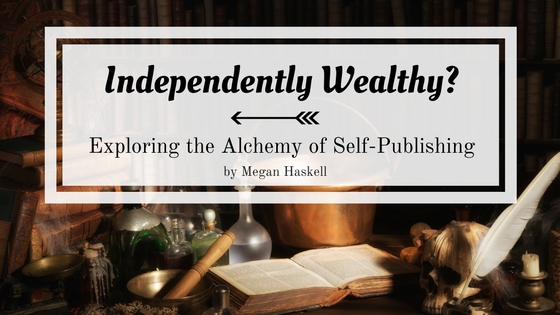by Megan Haskell
A hero. Every story needs one. I don’t care if you’re writing horror or romance, fantasy or thriller, you can’t have a story if you don’t have a protagonist. Even the anti-hero story has a hero, though perhaps not an admirable one.
Over the last two weeks, Lisanne Harrington talked about monsters, and Greta Boris covered your villains. Now it’s time to slay those beasts. But what does it take to write a good hero?
Purpose
Every hero needs a mission. A motive for slaying the dragon or catching the killer. This is most easily recognized in the inciting incident, the initial event or hook that launches the character into the story. However, it usually begins before page one.
For example, my fantasy series, The Sanyare Chronicles, opens with the attempted assassination of my heroine, Rie. She survives, but in so doing is framed for treason. In the land of the elves it’s an immediate death sentence, especially for the humans who are relegated to servants and slaves. What’s a girl to do?
Obviously, her primary desire or motivation is to save her own head. But her purpose is deeper and has its origins in her background.
Rie spent decades earning a place in elvish society as a messenger for the high court. It’s not much, but it’s something. Certainly better than hauling manure or scrubbing floors. Yet she’s still sneered at and mistrusted, given the crummy jobs none of the other messengers want. Now she’s the victim of an attack, but her survival condemns her to death. It’s unwarranted discrimination of the highest order.
Rie needs to prove her innocence to have any chance of survival, but she wants to prove that humans are as strong and as valuable as the elves. Her purpose, therefore, is to prove her own worth.
Skillz
Ya gotta have skillz to survive in da hood.
Okay, don’t ever let me attempt to speak “gangsta” in real life.
Seriously though, every hero needs the right skill set to defeat the villain or slay the monster. However, these skills must make sense for the character, the setting, and the story. An average housewife with no training can’t just pick up a gun and shoot the villain right between the eyes. There has to be a reason she’s a crack-shot. Maybe she was an Army brat and her dad used to take her out back to shoot tin cans off a fence. Better yet, maybe she joined the Army herself to pay for college. Whatever it is, the skills must have a purpose and be believable. (Also, the gun can’t just appear out of nowhere, it has to be in the story early, for a reason. But that’s a topic for another day.)
In Rie’s case, her foster father is a general in the king’s army. He and his wife were unable to conceive a child, so they raised Rie as a daughter instead of a slave. (In fact, her full name is Nuriel, which means servant-daughter in Tolkein’s elvish language.) He trained her to fight, especially hand-to-hand combat with bladed weapons (like the eight-inch knives she carries with her everywhere). In other words, she’s pretty kick-ass. These skills allow her to survive the initial assassination attempt, kill the monsters chasing after her, and ultimately defeat the villain.
In the novel Infected by Scott Sigler, Perry Dawsey is a brutish former football star going nowhere with his life. But, when he’s infected by a mysterious parasite that grows larger and stronger in his body every day, it’s his physical training that saves him. Let’s just say, his ability to withstand immense pain and ignore his own injuries gives him the strength he needs to help save the world. (If you want a horror story that will keep you up at night and never let go, I highly recommend Infected.)
Weakness
No matter how kick-ass your hero is, he needs to have something that humanizes him. Even Superman has kryptonite. Without a weakness, your hero will be unbelievable, too perfect, and your readers will find it difficult to connect. As we all know, if your reader can’t connect with your protagonist, your story is likely doomed to obscurity. In fact, I’d argue that the character weakness is at least as important, if not more important than their strength. So let’s take a closer look at the types of weaknesses and how to incorporate them into your character.
Disability
Some weaknesses are obvious big deal flaws. Physical, mental, and emotional disabilities all qualify as serious weaknesses. Monk is OCD, Daredevil is blind, The Good Doctor is autistic…these weaknesses create internal and external conflict for the characters and force them to overcome some major hurdles in their lives. Even if we’re not OCD, blind, or autistic, we can relate to their issues at least tangentially and are anxious to root for them.
That last point is huge. Whatever weakness you choose, it should help the reader cheer for your protagonist. Even with an anti-hero, the reader should be rooting for them to overcome their “dark side” and return to the good. Walter White in Breaking Bad loves his family so much, that when he’s put in a untenable position of leaving them penniless after his impending death from cancer (a physical disability or weakness), he turns to making and selling drugs. Sure, we don’t want him to sell drugs. He’s a bad guy. But nonetheless we’re rooting for him to find a way to support his family through expensive medical bills and ultimate death. (Of course, it all goes downhill from there, but I digress.)
Personality Flaw
Other flaws might be less visible, but can be equally sympathetic. Is your character too proud to ask for help? Too stubborn to let go of old grudges? Too young to understand the consequences of her actions?
Just like their skills, personality flaws should have developed from events or circumstances in the character’s past. They must make sense for the character, the setting, and the story. Mine your hero’s backstory for flaws that can be exploited. For example, Harry Potter is an orphan and fears abandonment. He’s also been bullied and abused his entire childhood until he goes to Hogwarts. He’ll do almost anything for love and respect.
Don’t we all want that?
Strength in Weakness, Weakness in Strength
As Greta mentioned last week, your hero’s weakness can and should be related to your villain or monster’s strength. In Sanyare: The Last Descendant (Book 1 of my series), Rie is naive. She’s lived her entire life following the rules and working within the system. Unfortunately, none of that matters when she’s framed for treason. She’s forced to step outside her comfort zone and explore the wider world, and she makes mistakes along the way. Without giving too much away, she trusts too easily and opens herself up to betrayal from a sneaky, underhanded antagonist.
But a weakness can also be a source of a character’s strength. For example, Iron Man is selfish and arrogant, believing so strongly in his own superior intellect he can’t understand why people at times refuse to blindly follow his orders. He hates having to explain himself. This isolates him from the world and engenders conflict. It also allows him to find creative solutions and pursue crazy ideas…like building the Iron Man suit in the first place.
Other weaknesses that might be turned into strengths:
- An anxious or fearful character might over-prepare for danger, and therefore survive
- A liar might be able to quickly talk himself out of a tight spot
- An unsociable introvert might overhear useful information
- A stubborn woman might refuse to give up, despite overwhelming odds
- A tough competitor might use that drive to (literally or figuratively) reach the finish line before the villain
- Someone who’s quick to judge might recognize a threat before it becomes a problem
- Someone who’s quick to anger might attack before the villain can hurt innocent bystanders
- A blind man might have stronger senses of hearing, smell, touch, or even be able to taste undetectable poisons
- A deaf woman might be able to read lips across great distances
There are at least a hundred other examples, but you get the idea. When a character can overcome a weakness or turn it into a strength, the reader won’t be able to stop turning the pages.
How do you build your heroes? Let’s discuss in the comments!
***

Megan Haskell, Author
Legend has it, I was born with a book in my hands. Thirty-ish years later, I’m a stay-at-home-mom who prefers a good story over doing the dishes. Only now, I’m building my own fantasy worlds! I’m the Award-Winning author of the Amazon bestselling series,The Sanyare Chronicles, co-author of Aspiring to Author: A Guide for Your Publishing Career, and Program Director of O.C. Writers. You can find me on my website at www.meganhaskell.com, Facebook, and Twitter.
*O.C. Writers is a participant in the Amazon Services LLC Associates Program, an affiliate advertising program designed to provide a means for us to earn fees by linking to Amazon.com and affiliated sites. By clicking on the book links anywhere on this site, we earn a small commission from your purchase.




Love this, Megan! I actually just had a brain storm the other day while working on my current book that dovetails into the bullet point about the deaf woman reading lips. While my character isn’t deaf, she is in a position where she’s often observing people from a distance. I’ve decided to give her the “super-power” of being able to read body language like a pro.
Even setting can be a weakness or disability you can turn into a strength.
Thanks Greta! I’m glad it helped, and lip reading can definitely be a useful skill!